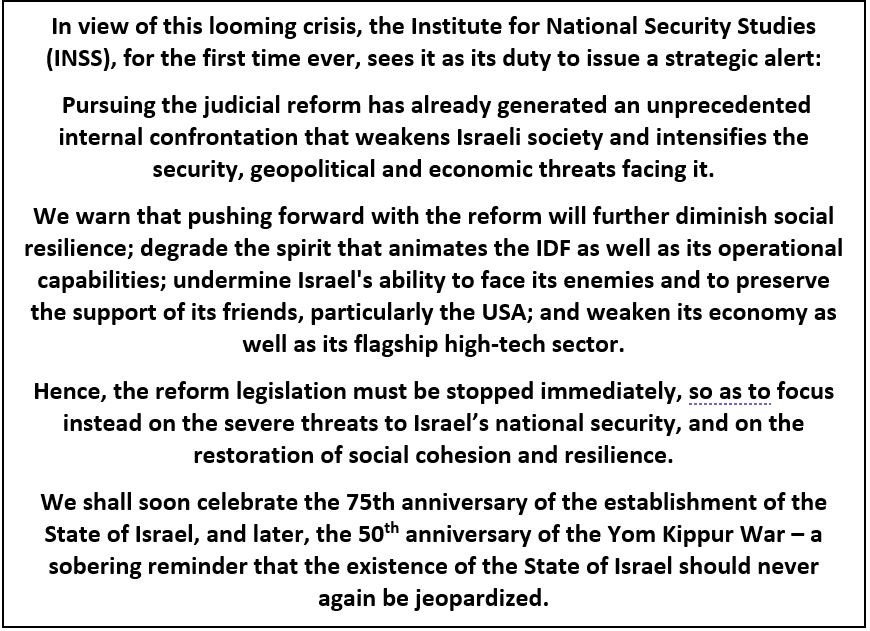Publications
Special Publication, March 21, 2023
Click here to read the full research paper on the subject
Israel is facing an ominous combination of severe threats to its national security, widening rifts in its relations with the US, and increasing economic risks amid the global economic crisis. At the same time, Israeli society is in the midst of an unprecedented internal conflict stemming from the proposed judicial reform, which magnifies these threats and impairs our ability to tackle them. Without dwelling on the controversial contents of the reform, this much is clear: the proposed reform entails a far-reaching change of the political and judicial regime of Israel, a change that many perceive as a serious threat to democracy. Furthermore, the reform is being pushed forward hastily, without a real opportunity to reach broad agreement. As a result, a widespread public outcry is growing in extent and intensity, inevitably seeping into all aspects of life in Israel, including into the IDF.
Two decades ago, Israel faced a fateful combination of crises on two fronts: the second intifada and the bursting of the dot-com bubble. We were then able to overcome them relying on the strength of social solidarity and the unity of purpose. This time we have to contend with grave challenges on three fronts, i.e., threats to Israel’s national security, international standing, and economic robustness. However, instead of closing ranks as we did then, the proposed judicial reform exacerbates political polarization and societal rifts and weakens social resilience, which is one of the main pillars of national security. Additionally, the reform shifts governmental attention and Israel’s collective energies towards this corrosive internal conflict, at the expense of dealing properly with the external threats.

Click here to read the full research paper on the subject
I. Security Threats
Security threats to Israel have recently intensified along key fronts, even before the introduction of the judicial reform: First, Iran has become a de facto nuclear threshold state, has acquired valuable military expertise from its role in the Ukraine war, and is set to receive advanced weapons systems from Russia. Meanwhile, it is deepening its regional influence and enhancing relations with its Gulf neighbors, brokered by China. Second, we are currently facing a worrying escalation on the Palestinian front, with a wave of terror attacks in the wake of the Palestinian Authority's weakness and the growth of extremist groups, while Ramadan approaches and with it the potential for wider unrest, particularly around the Temple Mount. Third, Hezbollah has been exhibiting a more aggressive behavior, indicating that deterrence might be eroding.
In these dire circumstances, we would have expected Israel to focus entirely on confronting these very serious threats, but unfortunately, the internal rift is badly affecting its ability to do so. The most severe impact is on the IDF as the one organization that was always above internal disputes, and on the readiness to serve in it, which relies not only on conscription but also on a deep sense of belonging and of a shared ethos. The impact is particularly severe on those serving in the reserves, especially in elite volunteer units – the air force, the commandos, and the military intelligence. Senior officers are struggling to navigate between the necessity to protect the IDF from the corrosive effects of the dispute, and their familiarity with those protesting the reform, many of them serving in the top units of the army.
There is no doubt that significant damage has already been done, not only in terms of the readiness to volunteer, but also in terms of cohesion and mutual trust within the army teams, and between them and their commanders. Furthermore, faith in the righteousness of Israel’s cause may falter if, in the eyes of many in the IDF ranks, those responsible for fateful decisions like going to war, stop abiding by democratic principles. Furthermore, the internal struggle absorbs the attention of the government and even of the security establishment, undermining their ability to deal with the pressing security issues – Iran, the Palestinians and the northern front. Finally, there is no doubt that Israel’s enemies draw encouragement from our internal rift, and may even be tempted to undertake dangerous actions as a result.
II. Damage to Relations with the USA and to Israel's International Standing
The world is closely following the internal turmoil in the wake of the proposed reform, and the almost universal reaction is of puzzlement and deep concern, ranging from heads of state to street protests. In particular, the special relationship with the United States, based not only on interests but also on shared values, shows signs of growing strain in the wake of the reform.
These are alarming developments, for in view of the most pressing security threat confronting Israel, namely, Iran, we need the strong support of the United States more than ever. Furthermore, the drive to expand the Abraham Accords to additional countries as a central goal of Israel's foreign policy depends to a significant extent on the goodwill of the United States. Therefore, the deterioration in these relations endangers one of the cornerstones of Israel's national security, and calls into question the rationale of thus pursuing the judicial reform. Israel's standing in other Western democracies is also affected, and even autocratic states wonder over the lack of stability and internal rifts that the crisis exposes. Countries in the region are also taking notice – in particular, the UAE is now more reluctant to deepen its relations with Israel, and other countries are distancing themselves as well.
III. The Economic Crisis
The corona virus, the war in Ukraine, and the escalating conflict between the US and China have shaken the global economy in recent years, causing high inflation, interest rate increases, and the retreat of globalization. The shockwaves are also reaching Israel, fueling inflation, causing layoffs in high-tech and harming growth. The situation is serious enough, and it should have prompted all the responsible parties to deal with it - the Treasury, the Bank of Israel and the Prime Minister - as was the case in the great crisis of 2008. Instead, the proposed reform is poised to inflict yet another blow to the economy, arising serious concerns among economic circles abroad, who warn of the dire consequences that might follow.
The sudden collapse of SVB Bank illustrated the fragility of the global economy, as well as the fateful consequences when trust in institutions is undermined. The high-tech sector in Israel is particularly sensitive to these risks since it is export oriented and relies on the continuous flow of venture capital from abroad. The efforts to enact the reform have increased political instability and economic uncertainty in Israel, thereby harming the confidence of investors and their willingness to invest here. Furthermore, high-tech employees and entrepreneurs have taken an active and conspicuous part in the protests against the reform, and some of them have even announced their intention to take their business activity out of the country. As in the case of the reservists, the issue is not whether these statements are justified, but rather the fact that they reflect deep feelings that may be consequential.
If the reform legislation continues, Israel's credit rating will most likely go down, with dire consequences for the economy. Above all, it will be very difficult to restore the damage to Israel's image as a country associated with economic success, which was built over decades of responsible economic policy, regime stability and an independent and reliable judiciary.
In view of this severe crisis, INSS issues for the first time, out of a deep sense of responsibility and with a heavy heart, this strategic alert.
Click here to read the full research paper on the subject



